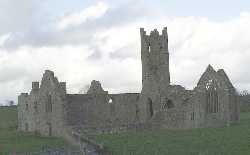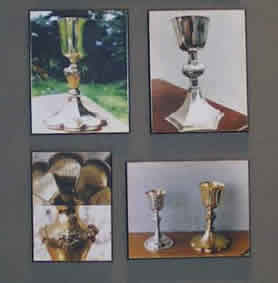| Kilmallock Abbey

© Kilmallock Abbey
The Dominican Friary or St. Saviour's Priory to give its
proper title was established in 1291 when Gilbert Fitzgerald of the White
Knights invited the Dominicans to the monastery that he had a built. The
Fitzgeralds were the main benefactors of the friary and Maurice Fitzgerald
was the main patron of the friary when it was enlarged in 1320. It is
situated across the river Lúbach from the former parish church
in Kilmallock.
The friars were forced to leave the area, as they had not
sought the permission of the feudal lord of Kilmallock, the Bishop of
the diocese. The church was built early in the 14th century and was a
simple rectangular building. In or around 1320 a tower was built; a window
was inserted in the south transept and an extension of the church to the
south.
In 1541 the friars left the abbey when the monastery was
dissolved and its lands and buildings confiscated. However, by around
1622, the monks returned to the priory.
Cromwellian forces under the leadership of Lord Inchiquin
sacked the priory in 1648. The friars never really returned to the priory
although some of the friars remained in the area in disguise and used
the chalices for religious service. In 1756, there were only three fathers
in Kilmallock. In 1790, the priory in Kilmallock was finally abandoned.
In 1639 three chalices were made for the convent in Kilmallock
and inscriptions on all three mention the Burgatt family. There is a plaque
to the Burgatt family in the choir of the priory. One of the chalices
was given by Callaghan O'Callaghan includes a prayer for Maurice, son
of Edward Fitzgibbon, the White Knight who died in 1608. Some of the chalices
of the abbey have survived due to the fact that when the abbey was shut
down.

© Chalices in Kilmallock
In the centre of the choir of the church lies the tomb of
the last White Knight, Edmund. The top of the tomb is broken in two and
there is a small hollow in the tomb, caused by dripping water, which is
called the braon shinsior. This is regarded as a mark of divine displeasure
of the way Edmund treated his fellow Catholics.
For a more detailed description of the Dominican Priory
in Kilmallock, there is a book by Arlene Hogan called "Kilmallock
Dominican Priory".
|